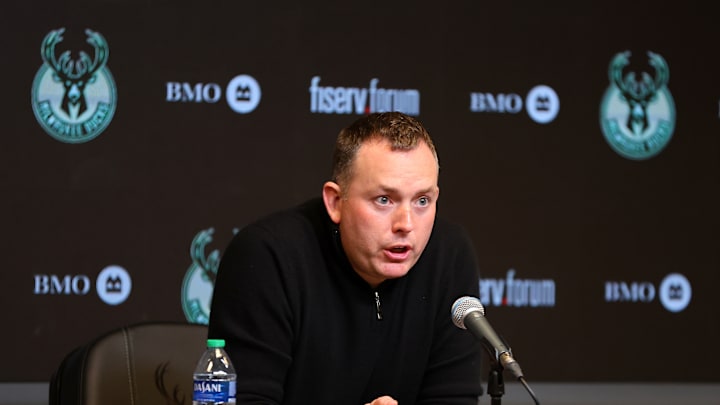Nico Harrison's firing just sent a message to every NBA general manager: moving your franchise superstar is a career-ending decision if it doesn't work out immediately.
Harrison dealt Luka Doncic and lasted nine months before getting shown the door. That's not enough time to rebuild, not enough time to prove a new direction, barely enough time to see what you actually got in return.
But with the chants of "Fire Nico" growing more deafening by the day, ownership didn't care. They saw their superstar gone and decided the architect of that move needed to go with him.
Nico Harrison's firing sets a precedent for front offices around the league
Whether fans realize it or not, the fate of Jon Horst is tied to Giannis. After all, Horst was the architect of the first team that Giannis led to a championship. Through different eras of Bucks basketball, from Eric Bledsoe, Khris Middleton, Damian Lillard, to Myles Turner now, the only true constants have been Giannis Antetokounmpo and Horst himself.
The precedent Harrison's firing sets for Jon Horst is crystal clear: his job security is directly tied to Giannis Antetokounmpo's presence in Milwaukee. The moment Giannis gets traded, Horst's countdown clock starts ticking, regardless of what comes back in the deal.
General managers live and die by their superstars. It's the uncomfortable truth nobody wants to say out loud, but Harrison's firing makes it undeniable. You don't survive trading a top-five player unless the return immediately produces championships. And even then, you're on borrowed time.
Horst has already won a title with Giannis. He's built multiple contending rosters around him. His entire tenure is defined by maximizing the Greek Freak's prime years. Trading Giannis doesn't just reset the franchise; it also erases Horst's entire body of work and starts a new era that won't include him.
The pressure on Horst is amplified by Milwaukee's ownership structure.
Wes Edens and the Haslam family have proven they're willing to spend. The Bucks paid over $52 million in luxury tax recently, ranking among the league's highest spenders. But that financial commitment comes with strings attached: ownership expects results when they're writing those checks.
The Haslams publicly said they wanted to "stay quiet and learn" when they bought in, but their track record with the Cleveland Browns shows they can lose patience quickly when things aren't working. This only means that Horst isn't just managing a basketball club's roster. He's also managing expectations from an ownership group that's invested heavily and wants to see championship returns on that investment.
The math is simple: keep Giannis and Horst keeps his job as long as they're competitive. Trade Giannis and Horst is probably gone within a year, successful rebuild or not. New ownership wants their own people making those kinds of franchise-altering decisions.
This is less about loyalty or sentimentality and more about job preservation. Horst knows that his best chance at long-term employment is convincing Giannis to stay and building around him, not cashing out for draft picks and hoping the next GM doesn't get credit for whatever comes next.
Harrison's firing is a warning shot to every executive in the league. Your superstar is your insurance policy. Trade them, and you better have another job lined up, because the one you have won't last long.
Horst isn't trading Giannis. Not just because it's bad for Milwaukee, but because it would be career suicide for him personally. Harrison just proved it.
Stay tuned for more Milwaukee Bucks analysis.
